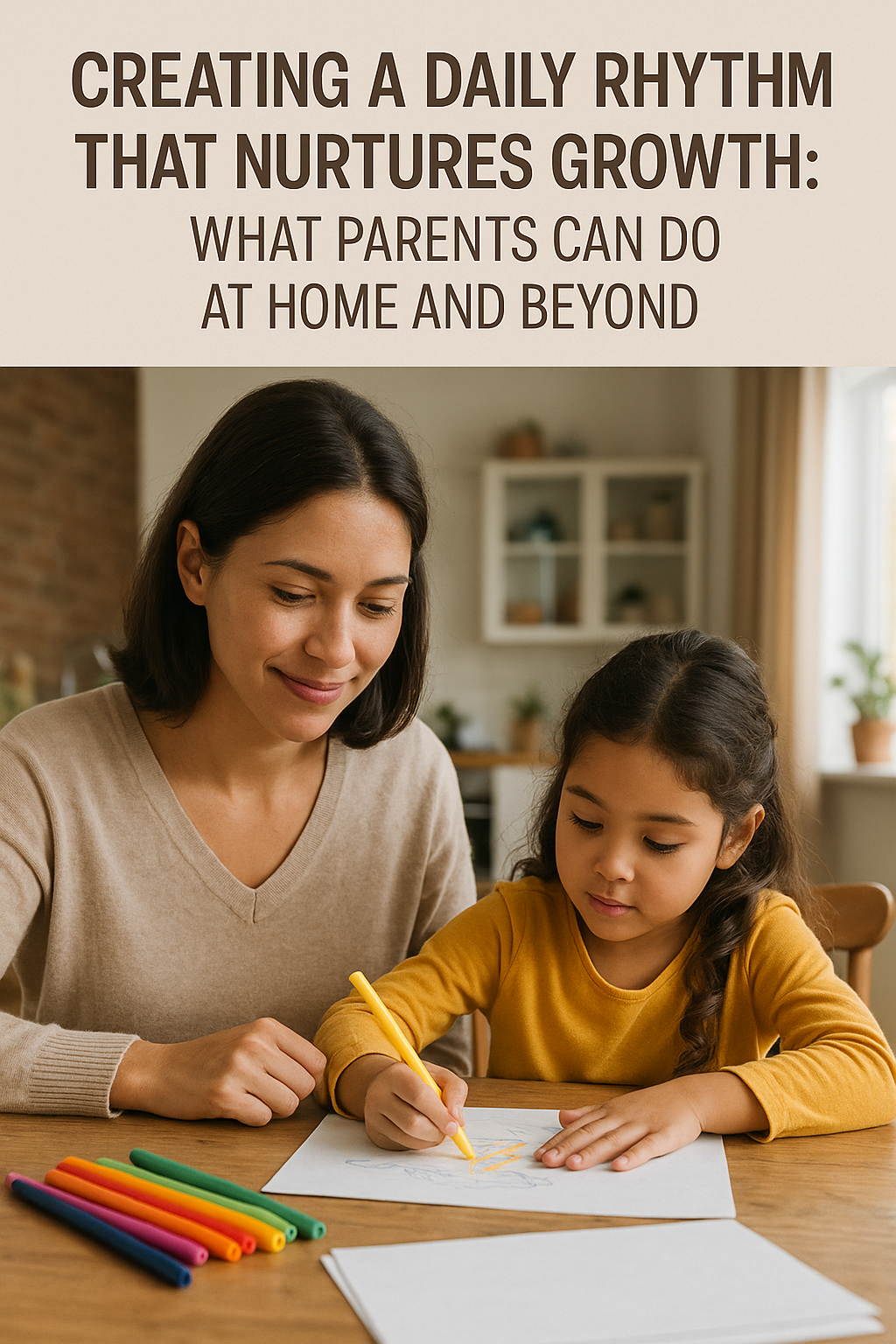The Importance of Consistent Routines for Young Minds
Every parent knows how quickly a day with small children can go from calm to chaos. Between snack times, tantrums, nap refusals, and spontaneous bursts of energy, it can feel like you’re living inside a whirlwind. But within that whirlwind, children are constantly learning—absorbing every pattern, every tone, every structure we introduce. And when it comes to early childhood development, creating consistent routines and safe environments is more than just helpful—it’s foundational.
Whether you’re a stay-at-home parent, working full-time, or managing something in between, how we structure our children’s days impacts everything from their emotional stability to their future love of learning.
Learning Beyond the Living Room
In many households, routines begin in the home: the same songs at bedtime, designated reading nooks, shared meals at the table. These daily patterns serve as emotional anchors, giving young children a sense of predictability in an often unpredictable world. But for many families, growth also continues beyond the walls of the house.
Early childhood environments outside the home—especially those that prioritize both structured learning and emotional care—play a vital role in a child’s journey. Choosing where your child spends their day isn’t just a logistical decision; it’s an emotional and developmental one too.
Whether your child is social and outgoing or shy and observant, they benefit from being in environments where their needs are understood and their potential is nurtured. That’s why parents often turn to well-reviewed child care centers like daycare in Dayton OH, where developmental milestones are celebrated alongside emotional well-being. From structured play to foundational academics, such settings can be a beautiful extension of the love and rhythm we try to create at home.
When the Right Support System Makes All the Difference
It’s easy to overlook how much invisible work goes into parenting—especially in those early years when your child might not yet have the words to say how they feel or what they need. Parents carry the emotional weight of decision-making: Is this the right activity? Should I have said no more firmly? Am I giving enough love and structure?
That’s why a reliable support system matters. Having a partner, friend, or trusted educator to lean on—someone who understands your child’s needs and your parenting values—can change everything.
Centers offering thoughtfully designed daycare in Dayton OH often prioritize collaboration with parents. They don’t just “watch kids”—they actively partner with families to build a shared understanding of what each child needs. With open communication, daily progress updates, and structured feedback, parents can feel empowered rather than anxious.
It’s that mutual respect between caregivers and parents that fosters a stronger sense of safety for the child. When children know the adults in their life are aligned—whether at home or in their care environment—they feel more confident to explore, learn, and grow.
Building Emotional Security One Day at a Time
What children crave most isn’t a room filled with toys or a schedule packed with enrichment. They want consistency. They want to know that someone will be there with a smile in the morning, a warm hand at snack time, and a familiar voice reading their favorite book. Emotional security doesn’t come from extravagance—it comes from predictability, attentiveness, and love.
At home, this can look like quiet routines: story time after lunch, a shared gratitude moment before bed, or even a special “check-in” talk each night. In care settings, it looks like knowing who their teacher is, where their cubby is, and what happens next after circle time. The simple routines that repeat each day are where emotional bonds form and learning becomes natural.
Balancing Personal Well-being and Child Development
For mothers and fathers alike, carving out space for your own mental well-being is just as important as nurturing your child’s. The burnout of modern parenting is real. It’s okay to need help. It’s okay to need time for yourself. And it’s more than okay to seek external support when it means giving your child a space to grow while you breathe a little deeper.
Parenting is not about doing everything alone—it’s about knowing what your child needs and what you need to thrive together. Sometimes that means choosing flexible work hours. Other times, it means leaning into supportive care options or simply saying yes to help when it’s offered.
Whether it’s finding a nearby center that blends learning and play or surrounding yourself with community-driven parenting groups, the goal remains the same: raise confident, emotionally healthy kids while honoring your own growth in the process.
The Small Moments That Make the Biggest Impact
In the midst of daily life, it’s the little things that shape our children most. The hug before drop-off, the way we speak during breakfast, the eye contact during a question—all of it tells them, “You are safe. You are seen. You are loved.”
The world can be overwhelming, but children don’t need perfection. They need presence. They need patience. And they need safe spaces—both at home and beyond—that nurture their sense of self.
By focusing on consistency, emotional safety, and collaborative support, families can raise children who aren’t just academically prepared—but emotionally resilient and joyful.
Bob Duncan is the lead writer and partner on ConversationsWithBianca.com. A passionate parent, he’s always excited to dive into the conversation about anything from parenting, food & drink, travel, to gifts & more!

